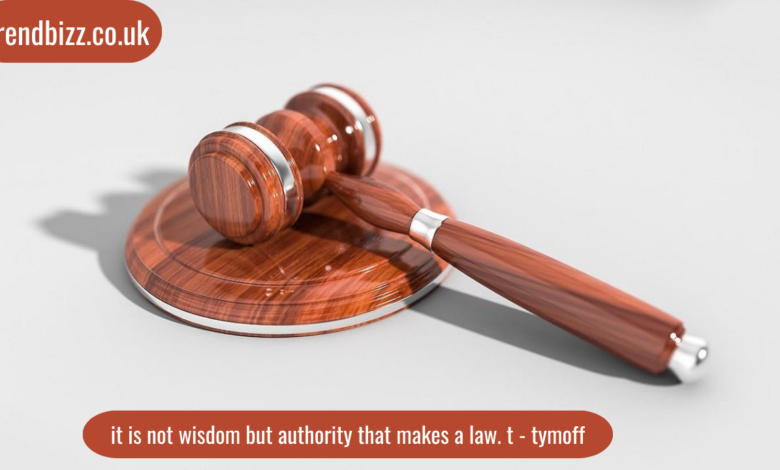It is Not Wisdom but Authority That Makes a Law. T – Tymoff: Understanding the Essence of Legal Power

Introduction
The phrase, “It is not wisdom but authority that makes a law. T – Tymoff,” raises profound questions about the nature of law and governance. It suggests that laws are established not necessarily because they are wise or just, but because an authoritative entity enforces them. This principle has been a subject of debate among philosophers, legal scholars, and political theorists. It challenges the notion that laws should be inherently wise and instead emphasizes that the power to impose and enforce laws is what ultimately shapes legal systems. This article explores the implications of this statement, its historical relevance, and its impact on society.
The Nature of Law: Authority vs. Wisdom
Laws are fundamental to maintaining order in society. They provide structure, set behavioral expectations, and ensure justice. However, the question arises—are laws inherently wise, or do they simply exist because authority dictates them?
The statement “It is not wisdom but authority that makes a law. T – Tymoff” highlights the reality that laws often originate from those in power rather than from an objective sense of wisdom. Throughout history, many laws have been enacted not because they are just or rational but because a ruling authority deemed them necessary. This raises concerns about the ethical and moral foundations of legal systems. If authority is the primary determinant of what becomes law, then societies may be subjected to rules that lack fairness and rationality.
Historical Examples of Authority Over Wisdom in Lawmaking
History provides numerous examples where laws were enacted based on authority rather than wisdom. Some of these laws were later overturned or amended due to their unjust nature, but their initial existence was solely due to the power wielded by those who enforced them.
- Apartheid Laws in South Africa – The apartheid system legally segregated people based on race, a policy implemented by those in authority despite its evident moral and ethical flaws. Wisdom did not create these laws—authority did.
- Jim Crow Laws in the United States – These laws enforced racial segregation and discrimination, reflecting the power of the lawmakers rather than a wise or just legal system.
- The Prohibition Era – In the early 20th century, the U.S. government imposed a nationwide ban on alcohol. While some believed it was a wise decision to curb social issues, the law was primarily driven by authority rather than universal wisdom. Eventually, it was repealed due to its failure.
These examples demonstrate how authority, rather than wisdom, has historically been the driving force behind legal decisions, often leading to societal turmoil and injustice.
The Role of Authority in Law Enforcement
Even if a law is based on wisdom, its effectiveness depends on the authority enforcing it. A well-crafted law without proper enforcement is meaningless. This reinforces the idea that laws derive their power not from their inherent wisdom but from the ability of governing bodies to enforce them.
For example, tax laws are upheld not necessarily because they are wise or fair, but because governments have the authority to penalize those who do not comply. Similarly, speed limits are enforced not because everyone agrees they are wise, but because law enforcement agencies have the power to issue fines and penalties for violations.
This reality raises ethical concerns: Should laws be created solely based on authority, or should wisdom play a more significant role in their formulation? In an ideal society, both elements should work together to create a just and functional legal system.
The Downside of an Authority-Driven Legal System
When laws are made purely based on authority, several issues arise:
- Lack of Fairness – Laws imposed without consideration for justice or wisdom can lead to social unrest and resentment.
- Oppression – Authoritarian regimes often use legal frameworks to suppress dissent and maintain control over populations.
- Arbitrary Changes – If laws are based only on the whims of those in power, they can change unpredictably, creating instability.
- Loss of Trust – If citizens perceive laws as unjust, they may resist compliance, leading to conflicts between the government and the people.
History has shown that when laws lack a foundation of wisdom, societies struggle with issues of oppression, inequality, and injustice.
Balancing Authority and Wisdom in Lawmaking
To create a just legal system, there must be a balance between authority and wisdom. While authority is necessary for enforcement, wisdom should guide the creation of laws. Here are some ways societies can achieve this balance:
- Democratic Participation – Laws should be created through democratic processes where diverse perspectives contribute to their formulation.
- Judicial Oversight – Courts should have the power to review laws and ensure they align with fundamental principles of justice.
- Ethical Considerations – Lawmakers should consider ethical implications when drafting legislation.
- Public Awareness and Input – Citizens should be informed about laws and have opportunities to voice their opinions on legislative matters.
By integrating these approaches, societies can ensure that laws are not only enforceable but also just and wise.
Conclusion
The statement “It is not wisdom but authority that makes a law. T – Tymoff” presents a stark reality about the nature of lawmaking. While wisdom ideally should guide legal frameworks, history demonstrates that authority often takes precedence. This dynamic has led to both progress and oppression, depending on how authority is exercised. The challenge for modern societies is to strike a balance where laws are not only enforced by authority but also rooted in wisdom to ensure fairness, justice, and social harmony.
FAQs
1. What does “It is not wisdom but authority that makes a law. T – Tymoff” mean?
- This phrase suggests that laws are established based on the power and authority of those in charge rather than their inherent wisdom or justice.
2. Are all laws based on authority rather than wisdom?
- While many laws are driven by authority, some are based on wisdom. However, even wise laws require authority for enforcement.
3. Can a law be both wise and authoritative?
- Yes, ideally, laws should be both fair and enforceable. A just society aims to create laws that balance wisdom with authoritative enforcement.
4. How can societies ensure laws are based on wisdom?
- Through democratic participation, judicial oversight, ethical considerations, and public input, societies can ensure laws are guided by wisdom as well as authority.
5. What are some historical examples of unjust laws?
- Apartheid laws, Jim Crow laws, and Prohibition laws are examples where authority enforced laws that lacked wisdom or fairness.
Understanding the distinction between authority and wisdom in lawmaking helps create a legal framework that is both effective and just. While authority is necessary for enforcing laws, wisdom must guide their creation to ensure they serve society equitably.



